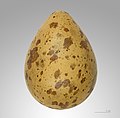Whimbrel
| Whimbrel | |
|---|---|
 | |
Conservation status | |
 Least Concern (IUCN 3.1)[1] | |
Scientific classification | |
| Kingdom: | Animalia |
| Phylum: | Chordata |
| Class: | Aves |
| Order: | Charadriiformes |
| Family: | Scolopacidae |
| Genus: | Numenius |
| Species: | N. phaeopus |
Binomial name | |
Numenius phaeopus (Linnaeus, 1758) | |
 | |
Synonyms | |
| |
The whimbrel (Numenius phaeopus) is a wader in the large family Scolopacidae. It is one of the most widespread of the curlews, breeding across much of subarctic North America, Asia and Europe as far south as Scotland.
The whimbrel is a migratory bird wintering on coasts in Africa, southern North America, South America, and South Asia into Australasia.[1] It is also a coastal bird during migration.[2] It is fairly gregarious outside the breeding season.
Contents
1 Description
1.1 Subspecies
2 Ecology
3 References
4 External links
Description
This is a fairly large wader though mid-sized as a member of the curlew genus. The English name is imitative of the bird's call.[3] The genus name Numenius is from Ancient Greek noumenios, a bird mentioned by Hesychius. It is associated with the curlews because it appears to be derived from neos, "new" and mene "moon", referring to the crescent-shaped bill. The species name phaeopus is the Medieval Latin name for the bird, from Ancient Greek phaios, "dusky" and pous, "foot".[4]
It is 37–47 cm (15–19 in) in length, 75–90 cm (30–35 in) in wingspan, and 270–493 g (9.5–17.4 oz; 0.595–1.087 lb) in weight.[5] It is mainly greyish brown, with a white back and rump (subspecies N. p. phaeopus and N. p. alboaxillaris only), and a long curved bill (longest in the adult female) with a kink rather than a smooth curve. It is generally wary.
The usual call is a rippling whistle, prolonged into a trill for the song.
The only similar common species over most of this bird's range are larger curlews. The whimbrel is smaller, has a shorter, decurved bill and has a central crown stripe and strong supercilia.
Subspecies
There are seven subspecies:[6]
N. p. islandicus – Brehm, C.L., 1831: found in Iceland and Ireland and Britain
N. p. phaeopus – (Linnaeus, 1758): nominate, found from Norway to north central Siberia
N. p. alboaxillaris – Lowe, 1921: found from western Kazakhstan to southwestern Siberia (rare, endangered)
N. p. rogachevae – Tomkovich, 2008: found in central Siberia
N. p. variegatus – (Scopoli, 1786): found in northeastern Siberia
N. p. rufiventris – Vigors, 1829: found in Alaska and northwestern Canada
N. p. hudsonicus – Latham, 1790: (Hudsonian curlew) found in Hudson Bay area to northeastern Canada
Ecology
This species feeds by probing soft mud for small invertebrates and by picking small crabs and similar prey off the surface. Before migration, berries become an important part of their diet. It has also been observed taking insects, specifically blue tiger butterflies.[7]
The nest is a bare scrape on tundra or Arctic moorland. Three to five eggs are laid. Adults are very defensive of nesting area and will even attack humans who come too close.
Near the end of the 19th century, hunting on their migration routes took a heavy toll on this bird's numbers; the population has since recovered.
In the Ireland and Britain, it breeds in Scotland, particularly around Shetland, Orkney, the Outer Hebrides as well as the mainland at Sutherland and Caithness.
The whimbrel is one of the species to which the Agreement on the Conservation of African-Eurasian Migratory Waterbirds (AEWA) applies.

Egg of whimbrel - MHNT

Inflight whimbrel in Lónsöræfi, Iceland

ID composite

Whimbrel stamp of the Faroe Islands
References
^ ab BirdLife International (2012). "Numenius phaeopus". The IUCN Red List of Threatened Species. IUCN: e.T22693178A38790708. doi:10.2305/IUCN.UK.2012-1.RLTS.T22693178A38790708.en..mw-parser-output cite.citation{font-style:inherit}.mw-parser-output q{quotes:"""""""'""'"}.mw-parser-output code.cs1-code{color:inherit;background:inherit;border:inherit;padding:inherit}.mw-parser-output .cs1-lock-free a{background:url("//upload.wikimedia.org/wikipedia/commons/thumb/6/65/Lock-green.svg/9px-Lock-green.svg.png")no-repeat;background-position:right .1em center}.mw-parser-output .cs1-lock-limited a,.mw-parser-output .cs1-lock-registration a{background:url("//upload.wikimedia.org/wikipedia/commons/thumb/d/d6/Lock-gray-alt-2.svg/9px-Lock-gray-alt-2.svg.png")no-repeat;background-position:right .1em center}.mw-parser-output .cs1-lock-subscription a{background:url("//upload.wikimedia.org/wikipedia/commons/thumb/a/aa/Lock-red-alt-2.svg/9px-Lock-red-alt-2.svg.png")no-repeat;background-position:right .1em center}.mw-parser-output .cs1-subscription,.mw-parser-output .cs1-registration{color:#555}.mw-parser-output .cs1-subscription span,.mw-parser-output .cs1-registration span{border-bottom:1px dotted;cursor:help}.mw-parser-output .cs1-hidden-error{display:none;font-size:100%}.mw-parser-output .cs1-visible-error{font-size:100%}.mw-parser-output .cs1-subscription,.mw-parser-output .cs1-registration,.mw-parser-output .cs1-format{font-size:95%}.mw-parser-output .cs1-kern-left,.mw-parser-output .cs1-kern-wl-left{padding-left:0.2em}.mw-parser-output .cs1-kern-right,.mw-parser-output .cs1-kern-wl-right{padding-right:0.2em}
^ Birds. Collins Pocket Guide. 1998. p. 156.
^ "Whimbrel". Oxford English Dictionary (3rd ed.). Oxford University Press. September 2005. (Subscription or UK public library membership required.)
^ Jobling, James A (2010). The Helm Dictionary of Scientific Bird Names. London: Christopher Helm. pp. 276, 301. ISBN 978-1-4081-2501-4.
^ "Whimbrel". All About Birds. Cornell Lab of Ornithology.
^ Gill, F.; Donsker, D., eds. (2014). "IOC World Bird List (v4.2)". doi:10.14344/IOC.ML.4.2. Retrieved 7 September 2014.
^ Woodall, P.F. (1996). "Whimbrel feeding on Blue Tiger butterflies". Sunbird. Queensland Ornithological Society. 26 (2): 46–48. ISSN 1037-258X.
External links
| Look up whimbrel in Wiktionary, the free dictionary. |
| Wikimedia Commons has media related to Numenius phaeopus. |
Wikispecies has information related to Numenius phaeopus |
Whimbrel Species Account – Cornell Lab of Ornithology- Whimbrel – Species text in The Atlas of Southern African Birds.
Whimbrel – Numenius phaeopus – USGS Patuxent Bird Identification InfoCenter
Whimbrel Migration Studies – The Center for Conservation Biology, College of William and Mary & Virginia Commonwealth University
Numenius phaeopus in the Flickr: Field Guide Birds of the World
RSPB Birds by Name: Whimbrel
"Whimbrel media". Internet Bird Collection.
Whimbrel photo gallery at VIREO (Drexel University)
Interactive range map of Numenius phaeopus at IUCN Red List maps
Audio recordings of Whimbrel on Xeno-canto.



